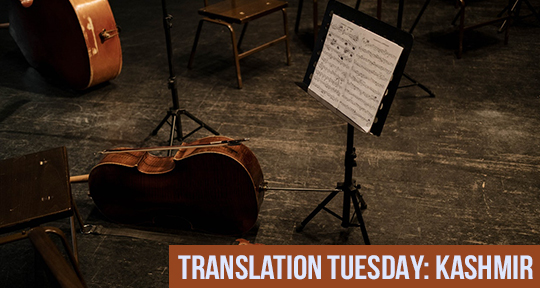When Rahman Rahi received one of India’s highest literary honours, the Jnanpith Award, the Kashmiri poet spoke of how the award is a recognition not only of his work but also of the “Kashmiri language and the people who speak this language.” This Translation Tuesday, we feature Rahi’s rhapsodic ode to the Kashmiri language, a beloved tongue that has gifted the poet the powers of perception, a tongue whom he personifies as an “eternal companion.” First written in 1966—after India and Pakistan went to war over the sovereignty of Kashmir—translator Ashaq Hussain Parray reminds us how the act of writing this poem is a way of “foregrounding Kashmiri agency after suffering years of oppression and political violence.” This immensely lyrical poem sings to the existential condition of being born into a language, how we inherit a language’s ways of seeing and its political histories even as we shape its trajectories as a single speaker, through a single poem.
“This polysemic poem, originally titled Jalveh Tei Zabur, opens Rahman Rahi’s 1997 collection Siyaah Rooda Jaren Manz (Under the Dark Downpours), and sings of language as the “house of being,” tracing the nature of Logos—the ultimate beginning of everything. Rahi sings a hymn to Kashmiri language that at once seems like a Kashmiri folksong vanvun and at the same time a sacred offering to the highest God, the word. The poem is extremely musical—using rhythm, irregular rhyme, both internal and end rhyme, symbolism, onomatopoeia, allegory, allusion—making it a typical modern poem, and difficult for a translator to get through. For that reason, I have used literal translation, borrowing, equivalence, transposition, compensation, and condensation techniques together—creating end rhymes, half-rhymes, false rhymes besides alliteration, and anaphora to create the rush and flow of the poem.”
—Ashaq Hussain Parray
Hymn to a Language
Sometimes I wonder if we had
never ever met each other
and if I had not conveyed
my joys and sorrows to you
with rich meanings
if you too had not blessed the wounds
of this statue of dust with a tongue—
my bosom would have stifled
my tears would have frozen
my thoughts would have broken
the Iris would have withered
the pigeon wouldn’t have cooed
the Jhelum would wail and weep
the hesitant hilltop would not greet
Moses would not one vision receive.
O Kashmiri language! I swear by you,
you are my awareness, my vision too
the radiant ray of my perception
the whirling violin of my conscience!
You and I are eternal companions
like sunshine to a blossom.
I was born, your sweet song I heard
I knew nothing; you taught me the word.
You suckled and sang me sweet lullabies
like a darling you lulled me in a cradle
and knit silk robes at dawn for me.
You trusted me to the fairies’ lap at dusk
when you whirred me on the violet wheel.
I flew over heavens on a couch of cotton
and when you played paternal notes on Noat1
my tears caused streams to flow in me.
When you washed my feet at the ghat
as if the scarred moon suddenly shone;
You blessed me with the pastoral songs
of village girls looking for dandelion leaves,
and flew me through dew-kissed pastures;
sometimes to geese you wished a long neck
sometimes the heart of wild mynas did you peck
sometimes at a village shrine threads you tied
sometimes in the city with storms you replied.
In spring water my bosom you washed bright,
your love has arrived under the moonlight
singing the silent songs softly for you.
Our pulse and hearts throb together:
a secret it is between a son and a mother.
Sometimes in this desert of life
ruthless winds of necessity rise—
an innocent naked bird from the nest
flies to fulfil its nascent desires best
and gets anxious when it goes west.
Slyly a sparrow hawk chases
this hapless feather bundle to dust;
watching its eyes roll under the bloody beak
I wonder if we two, the mother-son duo,
had never ever met each other?
What would I do to my frightened heart?
Where would I go with my restless soul?

